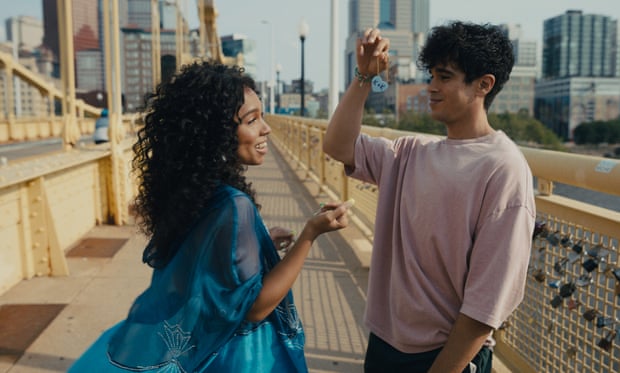Representation can be a double-edged sword. There’s undeniable power in seeing oneself reflected on screen, in normalizing marginalized identities, but an emphasis on visibility alone can reduce complex characters to one identity, one presentation, a checkbox on a list. This is the fine line walked by Anything’s Possible, a coming-of-age rom-com directed by Pose star Billy Porter, and in its smartest moments, the predominant internal dilemma for Kelsa (Eva Reign), a confident yet guarded Black, transgender teenager in Pittsburgh who, in her own words, wants to thrive in her senior year of high school rather than just survive.
Porter’s directorial debut, written by trans screenwriter Ximena García Lecuona, relies heavily on such hashtag parlance, which splits the 96-minute film, out on Amazon this week, about evenly between banal (if well-meaning) cliches and fresh fun. Example: “My best friends make survival look good,” Kelsa says in one of her YouTube videos, which double as voiceovers and effective segues. The comment alone is sassy and an effective introduction to her besties – diva Em (Courtnee Carter) and punk Chris (Kelly Lamor Wilson), both outsized personalities without much backstory – but gets run into the ground by the script’s consistent comparison of high school life to the animal kingdom, a la Mean Girls. (Kelsa, an aspiring zoologist, compares Chris to a howler monkey and the feeling of a crush to “having a freshwater eel in your throat”.)
Kelsa, like any high school girl, has some pressing concerns: she wants to get out of Pittsburgh for college in New York or LA. She’s trying to find the balance between uninhibited expression (all three girlfriends’ outfits take a page from Porter’s reputation as a gender-fluid fashion maven) and being treated like a normal teenager; she often invokes the “law of averages” to her single mother, played with almost too-fizzy energy by Renée Elise Goldsberry (Girls5Eva, Hamilton’s original Angelica) – as in, treat her as any average mother of an average teenage girl would.
But true to life and cinematic form, Kelsa is most pressed about a guy: Khal Zubai (Abubakr Ali, giving serious Dan Humphrey vibes), a nice Muslim boy whose Egyptian parents pressure him to attend a “good” four-year university. (It is refreshing to see a character aspire to attend a local trade school, instead of the Ivy League dreams of protagonists in recent teen films such as the To All the Boys I’ve Loved Before trilogy, Along for the Ride and Hello, Goodbye and Everything in Between.)
Khal, stammering and sweet, reciprocates Kelsa’s attraction, and the first half of the film is an immersive fall into like, then love, with them – despite Em’s stated interest in Khal, a roadblock that feels more contrivance than convincing. The two are bashful and endearingly awkward in person, but self-assured and confessional online – Kelsa in her YouTube videos, which evolve from diaristic accounts of hormone blockers to laments of making everything about gender to just relishing a crush; Khal as an anonymous Redditer in r/relationships, where he both dispenses and seeks advice (Lecuona has said a real Reddit post about asking out a trans girl inspired the screenplay.)
At times, the film gestures at thorny contradictions – Kelsa wants to speak directly about “trans stuff” on her public YouTube channel, but doesn’t want too much attention, wants Khal to care for all of her but not focus her trans-ness, wants to be seen and loved but not fought for. These paradoxes are specific to Kelsa’s experience but also broadly relatable to adolescence in the internet age, figuring out one’s identity and the balance between expression and over-exposure.
Unfortunately, the film hastily buries those complexities in a hairpin twist toward villainy, courtesy of Em and Otis (Grant Reynolds) – Khal’s best friend, a Black teenager whose blatant transphobia feels airdropped in – then just as hastily resolves most of said villainy for the sake of resolution. Until the bittersweet coda, the film’s second act devolves into what feels like an attempt to throw in references to as many pressing (and genuinely upsetting) trans issues as possible – bathroom bans, the false moral righteousness of TERFs, the terrifying experience of going viral on an internet full of trolls, white women co-opting Black women’s pain for attention. Any one of these scourges could have been interesting territory for testing Kelsa and Khal’s relationship with unfortunate, painful reality, but the result is less nuance than a cacophony of tweets-as-dialogue that don’t really add up to anything cohesive.
Thankfully, Anything’s Possible is light-hearted enough to glide past all that. Porter films his hometown of Pittsburgh with clear appreciation, though the film’s school scenes are stylistically indistinguishable from numerous Netflix teen productions. With a mop of dark curls brushed over batted eyes, the 31-year-old Ali looks younger than he is, but too old to be talking about SATs and college applications. Still, his chemistry with the dynamic Reign, more than up to the task as romantic lead, is enough to see their relationship through to the inevitable departure into the unknown, open future.
The answer often given for a lack of representation, trans representation specifically, on-screen is more, on all fronts, in all roles and genres. Anything’s Possible is another needed step in the right direction – a just-fine high school romantic comedy about an unapologetic, bold trans teenager on a major streaming platform.

